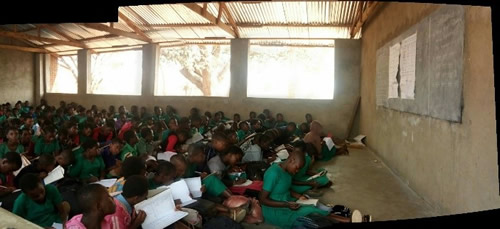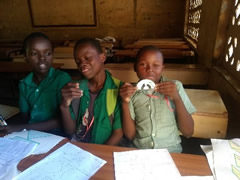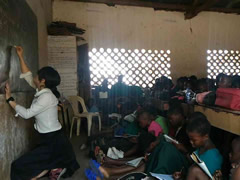- Home
- Countries & Regions
- Africa
- Malawi
- Topics & Events
- "Let's compete Mathematics in the graduate exams!"
Topics & Events
November 22, 2019
"Let's compete Mathematics in the graduate exams!"
I teach mathematics as a volunteer at St Theresa Primary School in Machinga District in Malawi. Since I started working there, I have mainly been teaching in senior classes.
By the end of the period of learning in standard 8, which is the last grade in Malawian primary, learners are required to sit for national examinations to assess their ability. The results of the examinations determine the students who graduate from primary school and those who will not. Furthermore, these results determine which type of secondary school they are going to attend. In other words, these examinations determines their future, so we can say that these are very important examinations to the learners.
Standard 8 leaners at St. Therese Primary School study from 6 am in the morning up to 5 pm in the evening every day to thoroughly prepare for the examinations. I was in charge of extracurricular class after the regular classes.
Every year, mathematics has been the subject that has produced worst results in these standard 8 examinations in the school. Many learners in the school developed an attitude that they cannot perform well in Mathematics. When I first started teaching mathematics in the school, I discovered that most of the learners were able to solve basic mathematics questions. The question that came into my mind was "Why do they lose marks during the examinations?" I had to search for an answer to this question. I finally found out that there is a difference between the way mathematics questions are presented in textbooks and the way how they are presented in examination papers. In Malawi, there are no worksheets, no workbooks and leaners are required to study using their textbooks only. If learners master the style which is used in mathematics examinations, they would score more marks. I then decided to teach them to get used to the questioning style of the final examinations.
Whenever I give mathematics questions from the past examination papers to the learners, they always work hard to solve them. Some of the learners are given mathematics questions to solve during extra classes which are conducted after their normal classes. Some of the parents give them gifts to express their appreciation for scoring well. I feel the passion for final examinations that these learners have and feel that I should fight together with them. Before the students sat for their final examination, I prepared mock examination for them and many leaners scored good marks in this examination. This gave me hope that these students were going to get good scores in their final examinations.
After the examinations, I met one of the standard 8 students and I asked him, "How was it?" and he said, "I think I made it!"
Later on, when the results were sent to the school, 14 students scored A (Excellent) 14 in mathematics, and 25 students scored B (Good) in mathematics. In the previous year, there were no student who scored more than a B. This was quite a big improvement in mathematics results of the students in the school. The leaners worked very hard and have been selected to national secondary schools, which are high level secondary schools in Malawi.
There are several factors that led to improvement of results in the school, but, personally, I think teaching classes referring to the past examination questions highly contributed to this improvement. Based with this experience, I am currently developing worksheets that will be used by learners when practicing examination style questions. I hope this will help leaners to open a wide window for their future.
 Supplemental study class. Over 800 pupils
Supplemental study class. Over 800 pupils
 Hand-made Protractor
Hand-made Protractor
 Seriously studying pupils
Seriously studying pupils

- Asia
- Oceania
- Latin America
- Africa
- Angola
- Benin
- Botswana
- Burkina Faso
- Burundi
- Cameroon
- Comoros
- Côte d'Ivoire
- Democratic Republic of the Congo
- Djibouti
- Eritrea
- Ethiopia
- Gabon
- Ghana
- Kenya
- Liberia
- Madagascar
- Malawi
- Mauritius
- Mozambique
- Namibia
- Niger
- Nigeria
- Rwanda
- Senegal
- Seychelles
- Sierra Leone
- Somalia
- South Africa
- South Sudan
- Sudan
- Tanzania
- Uganda
- Zambia
- Zimbabwe
- Middle East
- Europe
- About JICA
- News & Features
- Countries & Regions
- Our Work
- Thematic Issues
- Types of Assistance
- Partnerships with Other Development Partners
- Climate Change / Environmental and Social Considerations
- Evaluations
- Compliance and Anti-corruption
- Science and Technology Cooperation on Global Issues
- Research
- JICA Development Studies Program / JICA Chair
- Support for the Acceptance of Foreign HRs / Multicultural and Inclusive Community
- Publications
- Investor Relations
